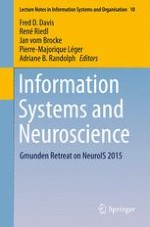2015 | OriginalPaper | Buchkapitel
The Impact of Interruptions on Technology Usage: Exploring Interdependencies Between Demands from Interruptions, Worker Control, and Role-Based Stress
verfasst von : Stefan Tams, Jason Thatcher, Manju Ahuja
Erschienen in: Information Systems and Neuroscience
Aktivieren Sie unsere intelligente Suche, um passende Fachinhalte oder Patente zu finden.
Wählen Sie Textabschnitte aus um mit Künstlicher Intelligenz passenden Patente zu finden. powered by
Markieren Sie Textabschnitte, um KI-gestützt weitere passende Inhalte zu finden. powered by
